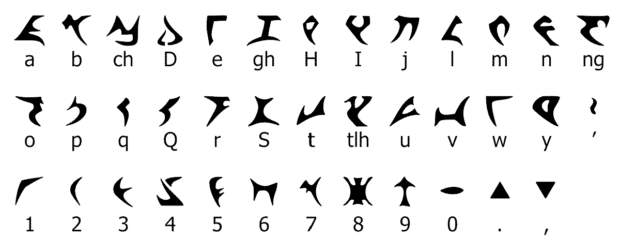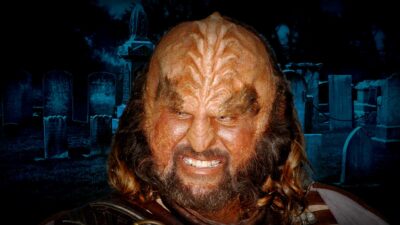Klingons are known for their short tempers, not their sense of humor. So, if you ever find yourself in a bar on the Klingon home world, Kronos, then make sure that you watch what you say. Insulting a Klingon, especially on purpose, probably isn’t a good idea. Here are some Klingon language phrases and insults that will probably get you killed.
Klingon Language Phrases That Will Probably Get You Killed
In case you are curious, here are some Klingon language phrases that, if you were to say to a Klingon, would probably get you killed.
Who knows, maybe some of these Klingon phrases will come in handy someday. More people around the world probably speak Latin, but speaking Klingon might score you some bonus points at your next ComicCon. Qapla’
NERD NOTE: Hello reader! I try hard, but I am not a Klingon language expert. If you notice a Klingon language or grammar mistake in this list of Klingon insults, then please let us know in the comments or use our contact page. We will happily give you a “Thank You” mention.
What do you want, fool?
- NuqneH (nuk-naeh) – “What do you want?”
- qoH (go-agagh) – “Fool”
Klingons aren’t known for their pleasantries. Their version of “hello” is closer to “What do you want?” Add “fool” to the end, and you are immediately on shaky ground.
Your stupid life is unsuccessful.
- Hutlh Qapla’ yInlIj QIp – Literally means, “Your stupid life is without success.”
One of the most important words in the Klingon language is their word for success, Qapla’. Instead of wishing someone a pleasant “goodbye,” Klingons will instead wish them “success” in battle. So using the word Qapla’ in an insult is even meaner.
- yInlIj – “your life”
- yIn – “life”
- Qlp – “stupid”
- Hutlh – “without”
- Qapla’ (Ka-pla!) – “success”
Yes! Well done, you Denebian slime devil!
- HIja’ majQa’ DenIb Qatlh – “Yes! Well done, you Denebian slime devil!”
Klingons are much for sarcasm, but this backhanded insult is sure to get you beat up by whoever hears you say this Klingon phrase. The Denobulans are a strange species that practice a complicated form of polygamy, rarely sleep, and hate to be touched. Dr. Phlox, from the TV series Star Trek Enterprise, is the most famous Denobulan in the Star Trek universe.
- HIja’ (hey-jah!) – “Yes” or literally “I do”
- majQa’ – “Well done!” or literally “Good you.”
- DenIb Qatlh – “Denebian slime devil”
No, you weakling dog. Go fu*k yourself.
- Ghobe’, Hom Ha’DIbaH. y’nt yalagochukof. – “No, you runt dog. Go f#$k yourself.”
Strength and power are critical attributes among Klingons. Calling a Klingon a lesser animal or implying that they are small and weak, like a runt, is very insulting.
- Ghobe’ (glow-begeh!) – “No”
- Hom – “runt”
- Ha’DIbaH – “dog”
- y’nt yalagochukof – “Go f#$k yourself”
You Weirdo
- P’takh (pe-taQ) – Literally means, “You weirdo.”
P’takh is a very common Klingon insult. Even celebrities have used it during their late-night talk show appearances.
I wish you a dishonorable death.
- quvHa’ Hegh SoH vIneH – Literally means, “I would like a dishonorable death for you” or literally “dishonorable death to you, I would like”
Klingons value honor above all else. There are few things worse than a dishonorable death for a Klingon. And in case you are curious, here are the individual words and phrases from that sentence.
- vIneH – I would like
- quvHa’ – Dishonorable
- Hegh – Death
- SoHvaD – To you
Where’s the bathroom? Your mother made bad Gagh.
- nuqDaq ‘oH puchpa”e’? (nuq-Daq oheh! puch-pa eehhh!) – Literally, “Where is the bathroom?”
- Qab gagh butI’ SoSlI’ – literally “Bad Gagh cooked your mother.”
The Klingon language phrase for where is the bathroom is a mouthful. Gagh is a traditional Klingon dish. It’s a plate of live worms. That’s right, it’s served raw. So the word “cooked” really means cooked as prepared. Just make sure that you chew your Gagh properly before swallowing. Otherwise, Gagh can survive in your intestines.
Stop! Come here! Your Bloodwine tastes like mucus!
- yImev. HIghoS. Iw HIq ‘IqnaH mum.
If your Klingon Bloodwine tastes bad, then yell this at your host as they are walking away. They will run back to you and kick your ass. It’s a pity that Klingon Bloodwine doesn’t have any bubbles.
- yImev (yim-ev) – “stop” or “no more”
- HIghoS (hieg-ghosh) – “come here”
- Iw HIq – “Bloodwine”
- ‘IqnaH – “mucus.”
- mum – “taste.”
Shut up! Your mother has a smooth forehead!
- bIjatlh ‘e’ yImev – “Shut up” or literally “do that no more.”
- Hab SoSlI’ Quch! – “Your mother has a smooth forehead!” or literally “smooth mother forehead.”
Klingons take pride in their textured foreheads. Smoother foreheads are less desirable and considered ugly.
Fictional Alien Languages In Sci-Fi Franchises
Alien languages are an inconvenient necessity in most sci-fi content. Instead of bombarding viewers with endless subtitles while characters rattle off repetitive fake alien language phrases (i.e., Leia’s negotiations with Jabba for Chewbabca’s bounty), thanks to some ingenious plot devices, all the actors can just speak English.
Here are some of the clever ways that sci-fi-writers deal with alien languages:
- Doctor Who: The Tardis automatically translates everything in Doctor Who.
- Farscape: The alien races in Farscape all use language translating bacteria to understand each other.
- Star Trek: There’s the “Universal Translator” in Star Trek.
- Star Wars: Sometimes it doesn’t matter what the aliens are saying. The Ewoks and Jawas from Star Wars, for example. Their grunts and chirps are often secondary to their body language and tone.
- Misc Shows: Remarkably, multiple members of an alien race can learn English after only a few moments of hearing it spoken. And strangely enough, different alien races will freely choose to speak English privately to each other instead of using their own native languages.
- Stargate: In some shows like Stargate, there will be a prominent alien language like Goa’uld, but only a handful of key phrases (i.e., Jaffa! Kree!) are ever spoken. Goa’uld words are used mostly as nouns in English sentences when discussing objects like an Al’kesh (attack ship) or the Chappa’ai (Stargate portal).
Why Klingon Is The Gold Standard Of All Sci-Fi Alien Languages
However, thanks to a brilliant linguist named Marc Okrand, Klingon is a fully constructed language (conlang). Dr. Okrand started working on the Klingon language in the 1980s for the Star Trek film franchise. In the years since, he’s evolved and perfected the Klingon language to the point where it’s a real language. Klingon isn’t just a string of words and phrases like in Stargate. Klingon has conjugated prefixes, pluralized words, and other nuances only found in real languages. As a result, the Klingon language has become the gold standard of conlangs and how other fictional alien tongues are compared to each other.
Klingon Language Sentence Structure
Part of the Klingon language’s appeal is its novelty. Not only is it full of different and unique sounds, but it also has a different sentence structure.
Most human languages follow a subject-verb-object structure. But Klingon is object-subject-verb. In addition to its different structures, Klingon also has several unique harsh sounds that require a slight bit of force to pronounce. The result is a choppy language difficult to whisper and one that naturally sounds alien.
Teaching Klingon Phrases To Star Trek Actors
Dr. Okrand didn’t just create a real functional language that sounded alien, but he also made sure that it would be actor friendly. The choppiness of the Klingon language allows actors to just memorize a string of syllables, instead of words using the Klingon alphabet.

To help the actors learn their lines, Okrand would write out the sentences phonetically. He also recorded their lines, so the actors could listen to the recordings and practice.
Creating Fictional Languages For Sci-Fi Projects
Okrand isn’t the first person ever to create a language for a work of fiction. One of the more well-known examples is Quenya; the language J.R.R. Tolkien created in the early 1900s for both The Hobbit and The Lord Of The Rings.
NERD NOTE: Marc Okrand is the go-to resource for alien languages in sci-fi properties. He has developed alien language dialog for Star Trek, Dune, and even the Na’vi in Avatar, among others.
Explore the Klingon language and its unique phrases… and insults! #klingonlanguageinsults #scifi #fictionalalienlanguages #klingonlanguagephrases #StarTrek #StarTrekLife #KlingonLife Share on X
Frank Wilson is a retired teacher with over 30 years of combined experience in the education, small business technology, and real estate business. He now blogs as a hobby and spends most days tinkering with old computers. Wilson is passionate about tech, enjoys fishing, and loves drinking beer.












Leave a Reply
You must be logged in to post a comment.